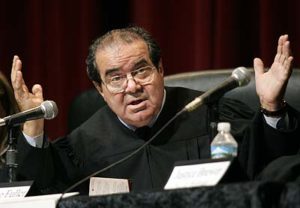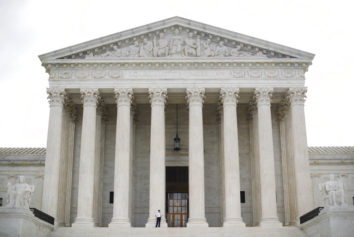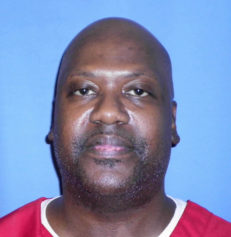
But according to Gawker, there is documented evidence of Scalia’s racism as far back as his days as a law professor. Gawker tracked down Black lawyers who took Scalia’s classes at the University of Chicago Law School, and they said even back then they saw evidence of his racism. They claimed Black students in Scalia’s classes received poor grades, but students who were members of the all-white Federalist Society received good grades.
Arnim Johnson took Scalia’s law class at the University of Chicago and was shocked to receive an F. He said receiving a failing grade is largely unheard of at an elite law school.
“While I was there, Scalia was outed as a blatant racist to the extent that the Black American Law Students Association (BALSA) chapter at the law school brought it to the attention of acting Dean Norval Morris in several meetings,” said Johnson in a Facebook post. “Scalia flunked every black student who took his classes that year. Nobody flunks courses in elite law schools. It’s unheard of. He flunked one brother so badly, it skewered his grade average, and he became the first, last, and only student in the history of the school to repeat first year. That man went on to become a respected [sic] military judge.”
Johnson also said Scalia was accused of the same thing at the University of Virginia, although the allegations were difficult to prove. Johnson added that he thought Scalia, who he described as a “a swarthy, son of poor Sicilian immigrants,” was trying to become an “honorary WASP,” by distancing himself from Black people.
However, Johnson later admitted he was mistaken about some of the events that happened 40 years ago. One of the people who he said failed the class, actually passed.
Gawker talked to another former Scalia student. Benn Streeter, who is now an attorney with the Federal Election Commission, said he noticed Scalia giving preferential treatment to the conservative students, who were all white at the time.
“The final exam in the admin law class was the only exam I’d taken at U of C that had a section of short-answer questions … What immediately struck me was that [the] answers were something that had never been covered in class, but it struck me that this was the kind of thing that he would talk to students about if students came by to visit him,” said Streeter.
Phillip Hampton, now senior counsel at Haynes and Boone in Washington, D.C., said he noticed all the Black students in Scalia’s got poor grades.
“It seemed very strange that almost every Black student’s lowest grade was in Scalia’s class,” said Hampton in a phone interview with Gawker. “I don’t think any Black person got more than a C- from Scalia…Black students received D’s and C’s, [and Scalia] failed Arnim [Johnson] along with another Black, very high-achieving student.”
It is clear from Scalia’s comments later in life that he didn’t think much of Black students’ academic prowess. In oral arguments last year, Scalia said affirmative action didn’t help Black students, who would be better off going to “a slower-track school where they do well.”
Scalia’s argument is erroneous for several reasons. Firstly, the Black students he flunked or gave bad grades, evidently must have been smart because they have all gone on to have stellar legal careers. Secondly, many white students get into elite schools, not based on their grade, but because they are legacies who get automatic admission because of their family connections. George W. Bush got into both Yale and Harvard, although he admitted he was an average student. However, his father and grandfather both attended Yale. According to The Huffington Post, a wing of the Yale library is named after Prescott Bush.
And thirdly, many of the students who attend so-called “slower track” schools go there not because they want to, but because that’s all they can afford. Some students don’t want to go elite schools because they don’t want to saddled with a lifetime of debt.
Although the Black students complained about unfair treatment, the university said grading was done on a “blind” basis. But Hampton says Scalia, who said he was a linguist, claimed he could tell Black students by their writing style.
The University of Chicago has issued a blanket denial of Scalia’s alleged unfair grading.
“Because of the length of time that has passed, and the fact that some of the individuals are either deceased or no longer work at the Law School, we are unable to comment on whether the allegations are true,” said a university spokesperson. “ … We would take extremely seriously any such allegation today, and our long-standing policy of blind-grading is intended to minimize the possibility of that kind of misconduct.”


